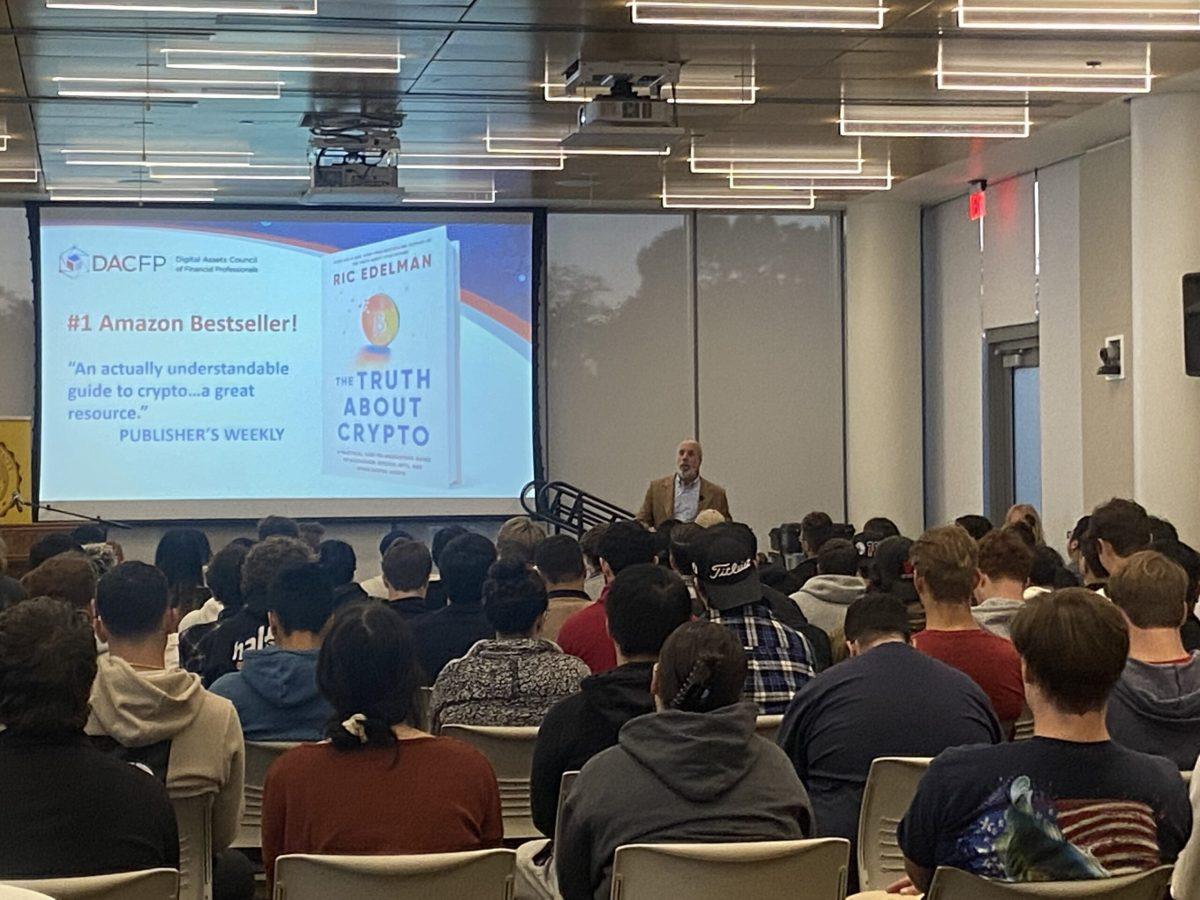Financial expert Ric Edelman spoke to students last Thursday, Oct. 20, on the ever-changing crypto and blockchain economy through the context of the “Crypto Winter” blockchain investors are currently encountering in 2022.
The figurehead for Edelman Financial Services has spent over 35 years in the industry and authored 12 books. His most recent publication, “The Truth About Crypto,” detailed his insight into the future of this revolutionary technology and how cautious Americans should be.
If a person was dazed about the idea of bitcoin or other cryptocurrencies, Edelman’s hour-long presentation at Rowan’s Business Hall left little room for misinterpretation.
“We’ve all heard of [bitcoin],” Edelman said. “Very few of us own it, and even fewer are able to explain what it is. So I’m going to do that for you.”
His major point of emphasis stems from the difference between the current trust industry of the American economy with an authentication-based economy. His argument on why the trust market is obsolete points towards negotiation middlemen and their tendency to inflate prices for unnecessary causes, specifically the real estate market.
He continued to detail how an authentication-based market can run on recently developed Distributed Ledger Technology (DLT), a blockchain style of software that is free to access and instantly cryptographically authenticates ownership or sale. This would remove the middleman from the deal.
According to Edelman, this technology is the “most tech innovation since the internet,” and bitcoin was the first product open to selling on a DLT.
He described how the immediate benefits of cryptocurrency can be seen all the way at the top corporations in the country. By having a secure way to send money internationally, wire transfers become a thing of the past and big companies like Walmart are beginning to install bitcoin ATMs in stores nationwide due to the consistent trade efficiency.
“You can donate money to charities with bitcoin. You can donate to political candidates. Universities are increasingly allowing students to pay for tuition with it,” Edelman said.
The investing professional is unconditionally aware of the objectors to the new payment technology and consistently advises to only hold 1% of one’s investment portfolio in cryptocurrency. Edelman explained how, due to the current Crypto Winter, bitcoin’s value is currently unknown and speculative estimations yield misinformation in the community.
Non-fungible tokens (NFTs), hold the most colorful future for crypto investors. NFT minters promise a virtual reality experience with customizable and unilateral avatars, a product driven by Meta’s new frontier — the Metaverse. With the inherent nature that NFTs hold no real-world value today, aside from claiming ownership of digital art, controversy arises from an asset owned specifically on speculation, both monetarily and idealistically.
Junior business student Roman Glenn watched the presentation at a table next to an array of food available for the audience at the main room of the business hall.
“I think there’s definitely some use to bitcoin,” Glenn said. “I think that if more people use it as a form of trade rather than a speculative asset which will appreciate in value, then I think it would hold more value.”
Edelman notes one of the best benefits of blockchain technology is that it is “not a centralized database.” The current centralized system of the online marketplace is extremely vulnerable to hacking, as all of a platform’s data is stored in one spot. Yet governments, including the United States, are using bitcoin and a decentralized database to their advantage.
In early June of 2021, Russian hackers successfully breached the database of the Colonial Pipeline, a massive gas and oil artery in the U.S. The database is responsible for major economic importance in the eastern part of the country. The hackers shut down the entire pipeline, skyrocketing gas prices for communities affected. After a week, the hackers sent a ransom note asking for $4.4 million dollars in bitcoin.
“Bitcoin is anonymous. It’s digital and it’s quick,” Edelman said, explaining why bitcoin was the currency of choice for these hackers.
But just as fast as the money left the pipeline’s pockets, the FBI tracked it down.
“They paid the $5 million in bitcoin to some anonymous address. It took the FBI two weeks to get the money back. Because digital money leaves a digital footprint, and the FBI were able to trace it,” Edelman said.
This, Edelman explained, is the main reason governments across the world are beginning to work with bitcoin and other blockchain technology — because digital footprints are trackable and can create an economy where cash and bank robberies become foregone symptoms of a digitized market.
Although a detailed lecture from a professional can clear up many doubts about cryptocurrency, some students may have similar rules to Glenn.
“My parents are completely against it right now. So they’re kind of telling me not to invest [in crypto],” Glenn said.
Edelman followed his presentation with an opportunity for students to receive an autographed copy of “The Truth About Crypto,” his novel with a more nuanced and detailed look on the crazy world of cryptocurrency.
For comments/questions about this story tweet @TheWhitOnline or email [email protected]



































































































































































































